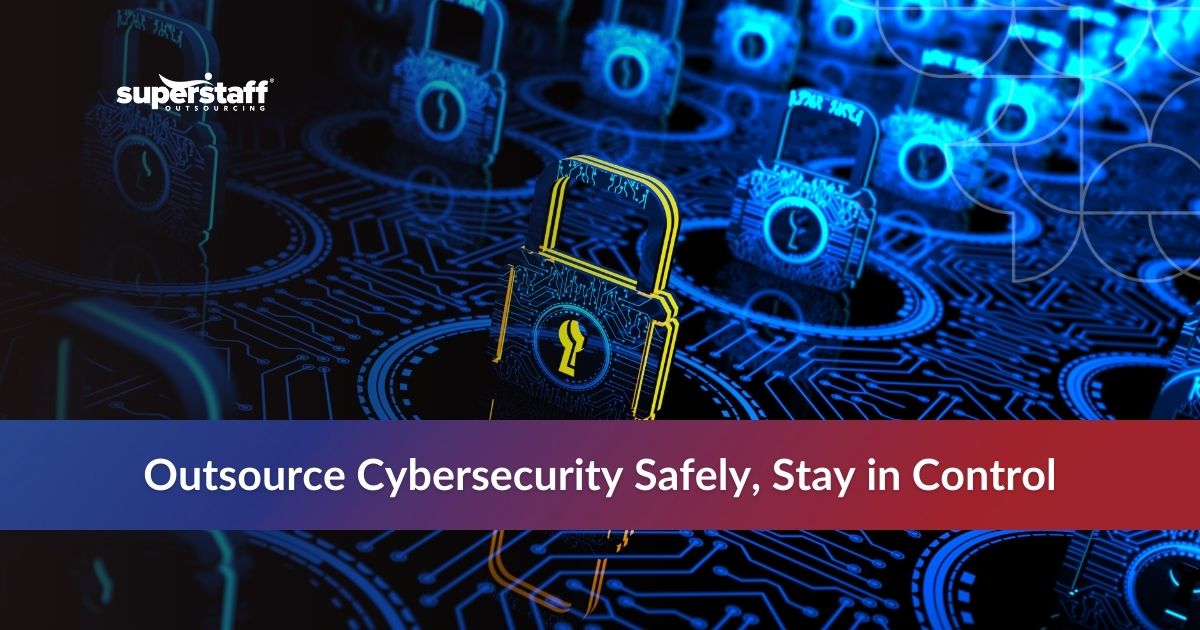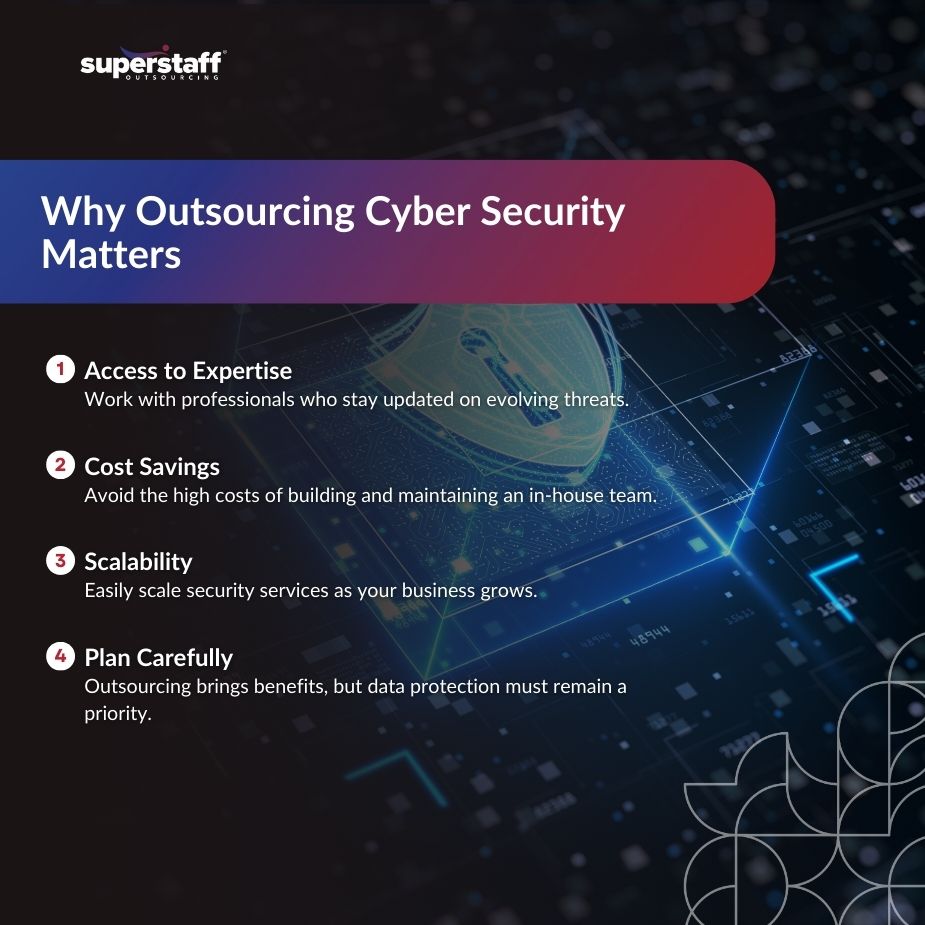
As cyber threats continue to evolve, businesses are increasingly turning to outsourcing as a way to strengthen their cybersecurity. By working with an external provider, companies can access specialized knowledge and tools that may be difficult or costly to develop in-house. This solution offers significant advantages, from reducing internal costs to improving security measures. However, the decision to outsource comes with its own set of risks, especially when it comes to handling sensitive data.
Effective outsourcing of cybersecurity requires careful planning and the right partner. Choosing a provider with the right expertise and security standards is essential to ensure that data remains protected. This guide will explore how businesses can navigate the complexities of outsourcing cybersecurity, from selecting the right partner to implementing safeguards that protect vital information.
Why Outsourcing Cybersecurity Matters

Businesses increasingly turn to outsourcing cybersecurity to reduce internal costs and access expertise in protecting digital assets. However, outsourcing cybersecurity requires careful planning to ensure data security is not compromised.
Here are some reasons why outsourcing cybersecurity can be beneficial:
- Access to Expertise: Outsourcing provides access to specialized professionals with deep knowledge of current threats, which may be difficult for in-house teams to match.
- Cost Savings: Managing cybersecurity internally can be expensive and resource-intensive. Outsourcing allows businesses to access high-level security without the associated costs of building and maintaining an in-house team.
- Scalability: Outsourced cybersecurity services are flexible, enabling businesses to adjust their security measures based on growth and evolving security threats.
However, these benefits come with risks that need to be managed carefully. We’ll explore how to protect sensitive data when outsourcing cybersecurity in the next sections.
Cybersecurity Risks in Outsourcing
Outsourcing cybersecurity can expose businesses to various risks, especially when sensitive information is involved. When sensitive data is handled by external providers, it creates potential vulnerabilities that could be exploited by cybercriminals. These risks include:
- Data Breaches: Without strong cybersecurity measures from an outsourced partner, businesses risk exposing sensitive data like financial records, customer information, and intellectual property. In fact, 60% of data breaches involve third-party vendors, making it crucial to choose a trusted partner with robust security protocols in place.
- Third-Party Vulnerabilities: The outsourcing partner’s security systems may not be as strong as your own, allowing cyber threats to infiltrate through their systems.
- Compliance Challenges: Outsourcing cybersecurity could create complications in maintaining industry-specific regulations or standards, particularly if data is shared across borders.
To avoid these risks, it’s vital to carefully select an outsourcing partner and implement safeguards. Next, let’s look at how to effectively vet potential outsourcing cybersecurity providers.
How to Vet Outsourcing Cybersecurity Providers
Choosing the right outsourcing partner for cybersecurity is one of the most important steps in ensuring your data remains secure. Here are the key factors to consider when evaluating potential providers:
-
Credentials and Certifications
Ensure that the outsourcing cybersecurity provider holds relevant certifications, such as ISO 27001 or SOC 2, which show their commitment to maintaining high security standards.
-
Industry Experience
Select a provider with experience in your industry. Every sector has unique cybersecurity needs, and a provider with knowledge of these specifics can better protect your business.
-
Security Audits and Monitoring
Ask whether the provider conducts regular security audits and has systems in place for continuous monitoring. This ensures that any vulnerabilities are detected early.
-
Incident Response Protocol
Review the provider’s incident response plan to ensure that they have clear steps in place for handling cybersecurity incidents, including data breaches.
By taking these steps, you can minimize the risk of outsourcing cybersecurity to a provider who may not meet your data protection standards.
Setting Clear Expectations in Outsourcing Cybersecurity Contracts
A well-crafted contract is crucial when outsourcing cybersecurity. It establishes clear terms regarding data protection, responsibilities, and expectations for both parties. Here are the key elements to include in your contract:
-
Non-Disclosure Agreements (NDAs)
A strong NDA is essential to protect sensitive data. The NDA should clearly outline confidentiality obligations to ensure that the outsourced provider cannot share or misuse your data.
-
Data Access Controls
Clearly define who can access your company’s data and under what circumstances. Make sure that access is limited to only those who absolutely need it.
-
Incident Reporting and Response
Establish a clear process for incident reporting. Include specific timeframes for reporting any cybersecurity breaches and the actions that will be taken to address them.
-
Regular Audits and Security Assessments
Include terms that require the provider to conduct regular security assessments and audits, ensuring they consistently meet agreed-upon standards.
By ensuring that these elements are included in your outsourcing cybersecurity contract, you can protect your business from potential risks.
Ongoing Monitoring and Auditing of Outsourced Cybersecurity
Once you’ve selected a reliable outsourcing cybersecurity provider and established clear contractual terms, it’s essential to maintain ongoing monitoring and auditing. Continuous oversight ensures that security protocols are consistently followed and that any vulnerabilities are addressed promptly.
Here are best practices for monitoring outsourced cybersecurity services:
-
Access Reviews
Periodically review who has access to sensitive data. Ensure that only authorized personnel can access specific information, and revoke access as necessary.
-
Security Audits
Schedule regular security audits to ensure that the outsourcing provider is adhering to all agreed-upon security practices. These audits help detect potential weaknesses before they can be exploited.
-
Continuous Threat Monitoring
Work with your outsourced provider to set up a system that continuously monitors for emerging cybersecurity risks and alerts you to any suspicious activity.
-
Employee Awareness
Your internal team should also be involved in maintaining cybersecurity. Provide regular training on recognizing phishing attempts, securing passwords, and following internal data protection protocols.
Ongoing monitoring and auditing are essential steps to ensure that your outsourced cybersecurity measures remain strong and effective.
Leveraging Technology to Strengthen Data Security
In addition to the human elements of cybersecurity, technology plays a critical role in protecting data when outsourcing cybersecurity. The right tools can enhance security and provide extra layers of protection for sensitive data.
Here are some technologies that can strengthen your outsourcing cybersecurity efforts:
- Virtual Private Networks (VPNs)
VPNs create secure, encrypted connections between your company’s network and the outsourced team, protecting data as it moves across the internet. In a NordVPN review by Cybernews, the service was highlighted for its strong security features—making it a reliable option for businesses looking to safeguard remote communications.
- Encryption
Encrypt sensitive data both in transit and at rest. This ensures that even if data is intercepted, it cannot be accessed by unauthorized parties.
- Two-Factor Authentication (2FA)
Implement two-factor authentication for accessing sensitive systems. This adds an extra layer of security, requiring a second form of verification in addition to a password.
Using these technologies, businesses can significantly improve the security of their outsourced cybersecurity operations and protect sensitive data from potential threats.
Outsourcing Cybersecurity with Confidence
Outsourcing cybersecurity can be an effective way to protect your business and streamline security operations. By carefully selecting a trusted outsourcing partner, setting clear expectations in your contract, and monitoring security efforts regularly, you can confidently outsource cybersecurity without compromising your business’s data security.
Ready to outsource cybersecurity without the risks? SuperStaff offers expert outsourcing solutions designed to protect your sensitive data while supporting your business operations. Let’s talk about how we can help you maintain high security standards and focus on what matters most: growing your business.






